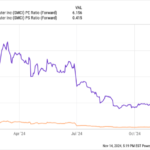Roughly three decades ago, the internet reshaped the growth trajectory of corporate America, catapulting businesses beyond their physical boundaries. This digital revolution has been the backbone of American business prosperity for years. Yet, the wait for the next transformative trend, capable of rivalling the internet’s impact, has been long.
However, a new contender has emerged on the scene – artificial intelligence (AI). This technological marvel has investors, both casual and professional, buzzing with excitement. The potential of AI-powered software and systems to excel in their assigned tasks autonomously, even acquiring new skills sans human intervention, makes it a valuable asset across various sectors and industries globally.
The Icarus Ascent of Nvidia, Broadcom, and AMD
On Wall Street’s stage, the leading AI players such as Nvidia, Broadcom, and Advanced Micro Devices stand tall, their stock charts painting a picture of success. Since the dawn of 2023, Nvidia has surged, adding over $3 trillion in market capitalization. Similarly, Broadcom and Advanced Micro Devices have recorded impressive gains of 216% and 141%, respectively, over slightly more than twenty-one months, all thanks to the AI wave.
Nvidia’s dominance shines through its hardware prowess. The company’s GPUs, particularly the H100 GPU (“Hopper”), act as the brains behind lightning-quick decision-making in AI-equipped data centers. The overwhelming demand for the H100 has allowed Nvidia to command premium prices, boosting their adjusted gross margin significantly.
Despite entering the AI race after Nvidia, Advanced Micro Devices is not lagging behind. Its MI300X AI GPUs, although more cost-effective, are attracting substantial demand. With Nvidia facing chip shortages, stalwarts like AMD are likely to divert AI GPU orders away from their competitor.
Recently, AMD unveiled its next-gen AI GPU, the Instinct MI325X. This chip is set to compete head-to-head with Nvidia’s upcoming Blackwell GPU architecture. Production of AMD’s new chip will commence later this year, ensuring it stays neck-and-neck with Blackwell.
Meanwhile, Broadcom has established itself as the go-to choice for businesses seeking AI networking solutions. Amidst its accolades in wireless chips and smartphone accessories, Broadcom’s Jericho3-AI fabric has played a pivotal role in minimizing tail latency and maximizing AI GPUs’ computational capabilities in high-powered data centers, driving a significant portion of the company’s revenue growth.
The Conundrum of Conviction in Wall Street’s AI Titans
Ceiling-topping growth rates and bullish affirmations from Nvidia’s CEO Jensen Huang, Broadcom’s CEO Hock Tan, and AMD’s CEO Lisa Su paint a rosy picture of the demand for AI solutions. However, a closer look at the actions of these industry leaders and other insiders reveals a significant disparity in conviction among Wall Street’s premier AI firms.
Every time an insider, be it a board member or a high-ranking executive, trades their company’s stock, it sends a powerful signal. With insiders purportedly at the helm of these AI giants exhibiting a lack of conviction, investors are left wondering about the future trajectory of these groundbreaking companies.
The Disquieting Silence of Insider Trades: A Cautionary Tale for Investors
Insider selling activity within the tech industry giants – Nvidia, Broadcom, and AMD – has cascaded down a troubling path. Over the course of one year, there were a staggering 138 distinct insider sales, with not a solitary open-market purchase from any of these powerhouses.
This one-sided trend is particularly stark when considering the lack of insider buys. In fact, the last insider purchase at Broadcom dates back a full 13 months, 46 months at Nvidia, and over five long years at AMD. The deafening absence of insider confidence subtly screams volumes.
While there can be various legitimate reasons behind insider selling – like covering tax obligations – the absence of insider buys is a glaring red flag. Insiders only part with their cash when they foresee a rise, setting the stage for a tense standoff between executives and potential investors.
Thus, the absence of conviction demonstrated by insiders raises pertinent questions. Why should common investors stake their fortunes on a technology sector that has yet to substantiate its promises?
An Opportunity Worth Seizing: A Timely Second Chance
Ever regret missing the chance to invest in game-changing stocks? Then, brace yourself for this unique opportunity.
Occasionally, a team of experts issues a compelling “Double Down” stock recommendation. This signals an imminent uptick in certain companies, presenting a fresh window for potential investors. The track record of such recommendations speaks volumes:
- Amazon: an initial $1,000 investment during a “Double Down” call in 2010 would have blossomed to a remarkable $21,285!
- Apple: a similar investment in 2008 would have seen your $1,000 grow to an astounding $44,456!
- Netflix: those who took the plunge in 2004 are now sitting on an enviable $411,959 from their $1,000 investment!
Currently, “Double Down” alerts are flashing for three exceptional companies. Such golden opportunities seldom knock twice, urging interested parties to act swiftly.
Explore 3 “Double Down” Stocks Now »
*Stock Advisor returns as of October 14, 2024





